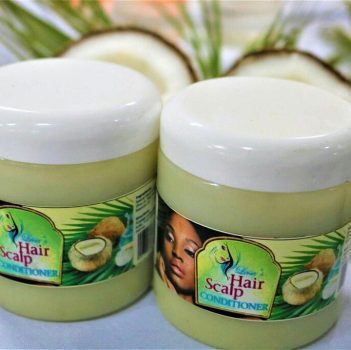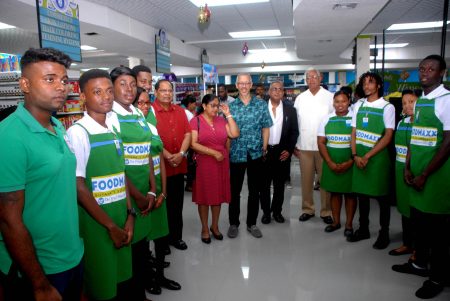Leisa Gibson is acutely aware of the likelihood that in a society where a preoccupation with hair is now the focal point of women’s fashion, her involvement in the sector, as a hairdresser for the past fifteen years and more recently as the manufacturer of natural hair and body products, may well be positioning her for entrepreneurial success.
Leisa’s Hair Scalp Conditioner, manufactured from ingredients that include locally produced coconut oil, bees wax, olive oil and (imported) ‘essential oils,’ has found its way into the homes of some of her clients and into the Guyana Marketing Corporation’s Guyana Shop and a handful of other small local products. Rather than being just another ‘beauty product,’ her Hair Scalp Conditioner, she says, seeks to focus on common customer complaints including receding hair corners and scalp conditions. She says that the number of repeat customers attests to the effectiveness of the remedies. The ‘clinics’ during which she addresses hair ‘issues’ usually take place at her place of business, 66 Mitchell Street, Section B, Pattensen, East Coast Demerara.
For local manufacturers marketing has been a mountain which they are yet to climb. For Leisa it has been no different. Her product promotion has been confined mostly to attendance at public events like fairs and exhibitions, her most recent outing being the recent Guyana Manufacturing & Services Association’s Uncapped event at the Sophia Pavilion. The rest of her sales come mostly through modest outlets in and out of Georgetown and through visitors to Leisa Salon and Beauty Supplies.
 She concedes that the journey from being just a hairdresser to becoming a manufacturer of hair products has been a rewarding one, not so much because her products, up until now, have brought her any great material return but because the exertions associated with marketing have imbued her with a stronger entrepreneurial spirit. Her Hair Scalp Conditioner has derived in large measure from conversations with visitors to her salon, concerned over their own hair problems.
She concedes that the journey from being just a hairdresser to becoming a manufacturer of hair products has been a rewarding one, not so much because her products, up until now, have brought her any great material return but because the exertions associated with marketing have imbued her with a stronger entrepreneurial spirit. Her Hair Scalp Conditioner has derived in large measure from conversations with visitors to her salon, concerned over their own hair problems.
What she has learnt from her ‘journey’ as a

manufacturer is that effective product promotion goes beyond parading ‘quality,’ and enters the challenging realm of labeling and packaging. She offers her own Hair Scalp Conditioner in two sizes out of imported bottles particularly designed for hair products and cosmetics. The labels are neat and readable though she concedes that she is still working with The Guyana Shop on issues of product presentation.
Even after two years the venture remains a work in progress, production limited – mostly by market uncertainties – to response to customer orders and to decisions to put it on display at public events.
Leisa is only too well aware that the process of finding market acceptance in product areas where imported competition is fierce depends on the producer’s ability to persuade the local outlet that the product can stand up to scrutiny. She is undaunted by the challenge, believing that the opportunity afforded by the likelihood of being afforded space on the shelves of major local supermarkets ought to serve as sufficient incentive for local producers to raise their game.





